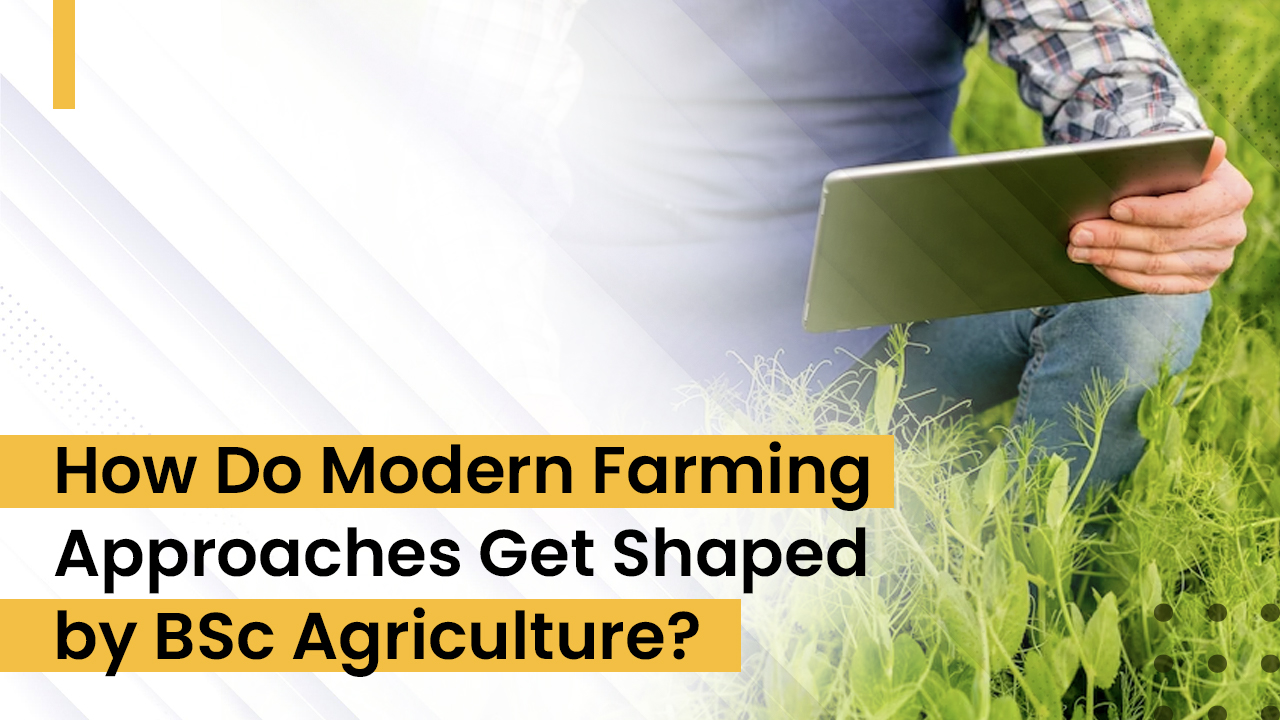As our world rides out a wave of uncertainty and major technological revolution at the same time, agriculture in India’s GDP declined from 35% in 1990-91 to 15% in 2022-23. Wars and progress, the decline in some industries, and the growth of others. One might think it’s a good thing that India is moving away from its commonwealth cash-cow crop status.
Others will say that we as the country with the largest population in the world should be able to feed ourselves and a lot would be saved by reducing imports and promoting exports. Still, one can’t deny that a human needs food to survive. India is still one of the largest exporters of a wide range of products – from NRI’s to agricultural products like beef and tea.
In this blog, we explore the BSc Agriculture course to discover how it shapes the future of farming. Read on to learn more about this undergraduate program at BSc Agriculture colleges in Bhopal, and elsewhere in India.
What is the BSc Agriculture Course?
Belonging to the Bachelor of Science programs, a Bachelor of Science (BSc) in Agriculture is a 4-year program that explores agriculture as a science, at BSc Agriculture colleges in Bhopal. Of course, it combines a variety of subjects like Soil Science, Meteorology, Pathology, Genetics, Microbiology, Engineering, etc. in the context of farming. Most BSc Agriculture colleges in Bhopal and elsewhere in India also combine this scientific theory with subjects like Agricultural Economics, Horticulture, and Agronomy to make the education more well-rounded.
| Course Name | Bachelor of Science in Agriculture |
| Level | Undergraduate |
| Duration | 4 years |
| Eligibility Criteria | 50% in 10+2 with PCM or Agriculture |
| Mode of Examination | Semester System |
| Admission Process | Merit-based |
| Average Course Fee | INR 2 – 6 Lakhs |
| Average Salary | INR 2 – 9 LPA |
| Top Recruiters | Government Agriculture Boards, Amul, Forestry Department, Farms, Agritech Companies, Research Institutions, FMCG, Agro businesses, etc. |
What are Modern Farming Methods?
Modern farming methods usually refer to resource-intensive, output-maximizing farming practices that technological developments have made possible. These technological developments are brought to the public by some of the top agriculture colleges in MP and other states of India.
Some examples of modern farming methods taught at the best university in MP may include the following:
- Precision Farming
- Aeroponics
- Hydroponics
- Use of Drones in Agriculture
- Monoculture
- Vertical Farming
- Use of Modern Pesticides and Fertilisers
Implications of Modern Farming Methods
The introduction of modern farming methods has increased production significantly, as it should. All the top universities in Bhopal and other parts of India acknowledge that. However, for example, the same fertiliser that made more production possible also does irreparable harm to the total combined output of different agricultural businesses in many ways, such as:
- Runoff from the pesticides mixes in the water, stunting fish growth, and starving the fishing industry,
- Extra pesticides leach into the soil, polluting it. The output from excessive fertiliser use peaks early, with declining produce after a few years until the soil becomes unusable.
- More unusable land leads to more hungry people in the long run.
Sustainable Farming: The Balance of Environmentally Friendly Technologies
“A Sustainable Agriculture system is one that can indefinitely meet demands for food and fibre at socially acceptable, economic and environment cost” (Crosson, 1992).
This is the most modern approach to farming that BSc Agriculture colleges in Bhopal and the rest of the world encourage. Sustainable farming refers to a system of agriculture and distribution, that can:
- Achieve the integration of natural biological cycles and ecosystems
- Protect and renew soil fertility, or preserve it by exclusion
- Reduce usage of non-renewable resources and purchased inputs
- Provide adequate and dependable income
- Provide opportunities to family and communal farms
- Minimise negative impacts on health, wildlife, safety, environment, and water quality.
Let us now explore how sustainable farming is explored in BSc Agriculture colleges in MP.
Agronomy
The subject called Agronomy combines various topics like crop production, water resource management, irrigation techniques, organic farming, and sustainable farming. This is taught by BSc agriculture colleges in MP and the rest of India to equip them with the necessary knowledge to grow their food sustainably.
Plant Genetics
Basic Biotechnology, basics of genetics, plant breeding, seed technology, and GMO technology are taught in this subject, equipping students from the best private university in Bhopal with the technical know-how to:
- Distinguish between the impact of different breeds of GMOs can have on a local ecosystem
- Make use of their knowledge acquired at agriculture colleges in MP to procure the best seeds for their personal or professional use
Agribusiness Management
Since agriculture always has been a significant part of India’s economy, agribusinesses have the opportunity to fill in the gap between production and processing, generating more revenue and creating more jobs along the way. BSc Agriculture colleges in Bhopal and elsewhere include modules on agricultural management, marketing, agricultural economics, etc so that students can manage their businesses or work professionally in the sector.
Careers After BSc Agriculture
Studying in one of the best agriculture colleges in MP can open up various opportunities for students in agriculture and allied industries. Some of the common job roles are listed in the table below:
| Job Role | Salary Average (INR) |
| Agronomist | 4,00,000 – 6,00,000 PA |
| Agricultural Scientist | 5,00,000 – 10,00,000 PA |
| Farm Manager | 3,00,000 – 5,00,000 PA |
| Agribusiness Consultant | 4,50,000 – 9,00,000 PA |
| Food Safety Inspector | 3,50,000 – 7,00,000 PA |
Keep in mind that these figures are just estimations and the exact pay of a student from BSc Agriculture colleges in Bhopal may differ based on factors like:
- Location
- Employer
- Experience
- Additional qualifications
- Portfolios.
Conclusion
As we round this blog up, we can agree that BSc agriculture colleges in Bhopal and the rest of the country play a significant part in continuing the practice of agriculture in our country. Through a sustainable approach to farming, more jobs can be created, while saving the environment and feeding the hungry.
FAQs
1) What technological skills do BSc Agriculture graduates possess?
BSc agricultural graduates possess technological skills to operate farming machinery, software, and hardware, engage in agricultural engineering, asses soil, water, and much more.
2) Can BSc Agriculture graduates pursue careers outside of farming?
Yes, BSc agriculture graduates can pursue careers outside farming like owning agribusiness, in research, in technology companies invested in agriculture, in government organizations, and much more.
3) Do I need to sit for an entrance exam to get into a BSc agriculture course?
Depends on the college. Some colleges take admission to their BSc agriculture course based on entrance exams, while some do not.
4) How does BSc Agriculture contribute to sustainable farming in India?
BSc Agriculture contributes to sustainable farming in India by equipping them with the necessary knowledge to practice and propagate sustainable farming approaches.


